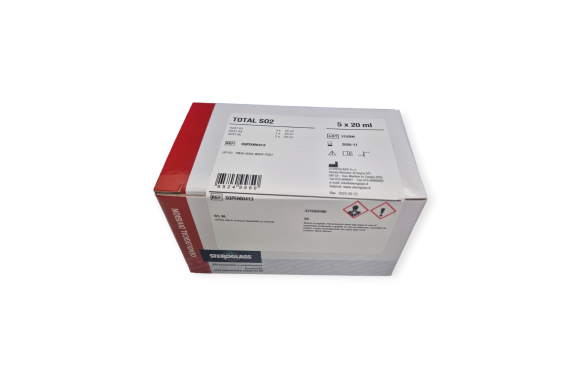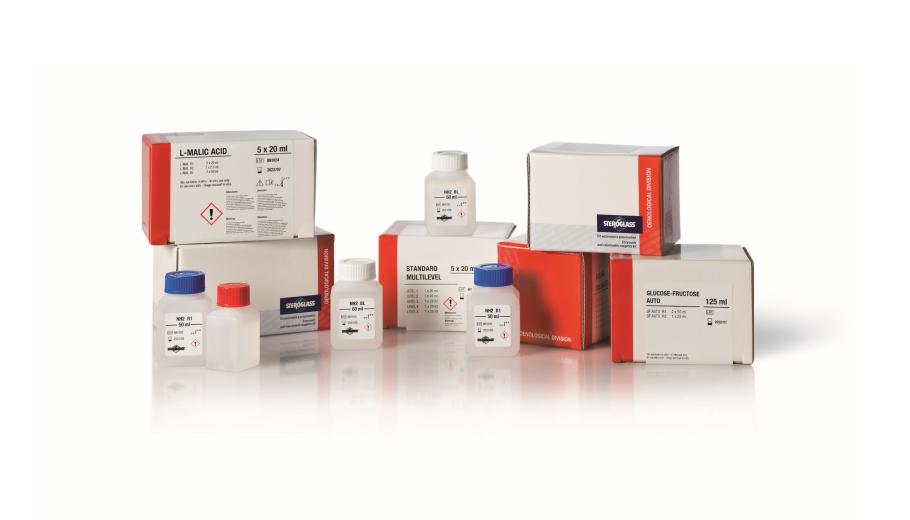Free and Total SO2 kit
Contact our expert for more informations.

The concentration of SO2 found in wines depends on the yeast's ability to produce SO2 during alcoholic fermentation, up to a maximum of 10 mg/l, and, to a greater extent, on the amount of SO2 added during the various stages of winemaking. This additive is regulated by legal limits, 200 mg/l of total SO2 for white wines and 150 mg/l of total SO2 for red wines.
Sulfur dioxide in wine exists in different forms: molecular, with antiseptic and anti-oxidative action; free, with antioxidant and antimicrobial action; and combined, bound to acetaldehyde, anthocyanins, and/or keto acids. The different fractions depend on the composition of the wine, temperature, pH, and winemaking techniques.
Free SO2 is monitored primarily during aging to maintain values between 30 and 40 mg/l, also depending on the management of malolactic fermentation. Total SO2 represents the sum of the different fractions present in the wine and is considered in reference to legal limits. If achieving effective free SO2 values requires a high total SO2 value, it indicates that a significant portion of the sulfur dioxide has combined with specific compounds in the wine.
Benefits
-
Anidride solforosa e la titolazione
L'SO2 (anidride solforosa) è un conservante naturale ampiamente utilizzato nel settore vinicolo per prevenire l'ossidazione e garantire la stabilità del vino nel tempo. L'analisi dell'SO2 libera consente di determinare la quantità di SO2 presente nel vino in forma attiva, rivelando l'efficacia della sua protezione e consentendo eventuali correzioni.
Il Titolatore Automatico FLASH offre una soluzione avanzata per le titolazioni potenziometriche dell'SO2 libera e totale e l'automazione del processo riduce i tempi di analisi, aumentando l'efficienza del laboratorio.
Technical features
ADVANTAGES
READY TO USE: Liquid and easy to use.
PRECISION AND SPECIFICITY: Characterized by high specificity, they provide accurate and repeatable data.
LOW COSTS AND LONG SHELF LIFE: Minimal cost per test and a long shelf life (average 24 months).
FAST ANALYSIS: Allow for quick and reliable results (up to 300 tests/hour), especially when used with automated instruments like our HYPERLAB series analyzers.
SIMPLE AND ECONOMIC CALIBRATION: It is possible to use single-method and/or multi-parametric calibration/verification standards. The determination of the Blank is performed automatically every 12 hours with the Hyperlab analyzers.
METHODS APPROVED BY INTERNATIONAL STANDARDS: Numerous enzymatic methods have been approved and validated by international organizations such as:
ISO (International Standardization Organization)
AOAC (American Association of Analytical Chemists)
IFU (International Federation of Fruit Juice Producers)
OIV (International Wine Office)
IDF (International Dairy Federation)
EBC (European Brewery Convention) and many others.
STERGLASS ENZYMATIC AND COLORIMETRIC KITS
Enzymatic and colorimetric kits are widely used in quality control for the main analytical determinations of a variety of food products such as fruit juices, wine, beer, dairy products, eggs, meat, and for the monitoring of fermentation processes carried out by microorganisms for the determination of sugars, organic acids, and other components such as sulfites, phenolic compounds, and metals.
Based on high-quality purified enzymes, enzymatic analysis allows for precise, highly accurate, and repeatable measurements, even in complex matrices. The absorbance variation, measured spectrophotometrically as a result of enzymatic transformations, is closely correlated with the concentration of the various analytes sought.
Industries
Applications
Product codes
| Steroglass code | Description | n° of analyses |
|---|---|---|
| SQPE056384 | FREE SO2 - 2x100ml | manual 100/200; automatic 400/600 |
| SQPE060413 | TOTAL SO2 - 5x20ml | manual 50/100; automatic 200/300 |
